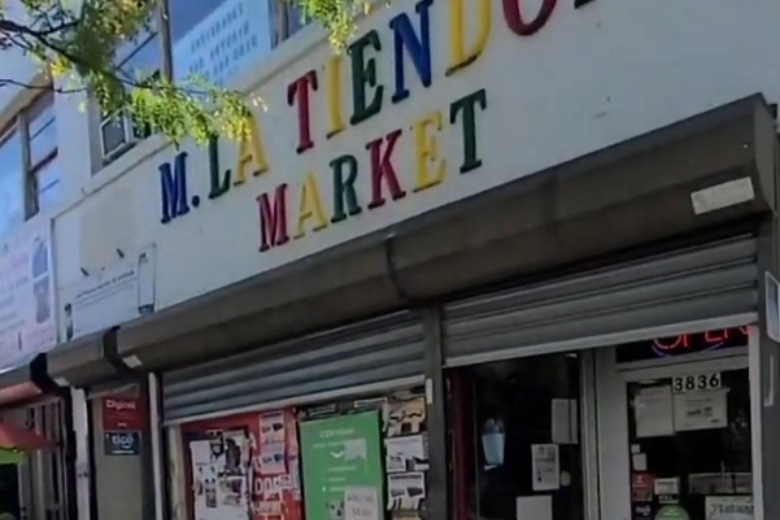This video is no longer available.
WTOP celebrates National Hispanic Heritage Month this Sept. 15 through Oct. 15, with stories spotlighting the contributions, culture and accomplishments of Hispanic communities across the D.C. region.
Parts of Northern Virginia’s Potomac Yard, Del Ray and Crystal City converge in community where generations of immigrants have set roots to escape the dangers of their home countries and seek out opportunities in hopes of a better future.
Along Mount Vernon Avenue, between South and West Glebe roads, in the area known as “Arlandria” (a portmanteau of Arlington and Alexandria) lies the Chirilagua neighborhood — home to many immigrant businesses. Salvadoran immigrants who came to the neighborhood in the 1980s gave it the nickname “Chirilagua” after a city on the Pacific coast of El Salvador.
From the moment you cross the Four Mile Run stream, you can feel the energy change.
On Sundays, farmers markets and street vendors set up catering to families out running their weekend errands at their favorite “tienda Latina.” Children play while their parents shop, as music from boom boxes wafts on every block of the less than a milelong stretch. It’s also a time for friends to catch up and for preachers to deliver their inspiring messages.
Meanwhile, inside the stores, you can hear shopkeepers taking orders in a tone familiar and comforting to many.
And of course, the smells emanating from the bakeries and pupusa shops can’t be ignored.
A ‘United Nations’ in the heart of Arlandria
Doña Flor Linaref has run the restaurant El Pulgarcito for the last seven years and lived in the area for three decades. Linaref said the neighborhood has changed dramatically since she first arrived.
In the 1980s and 1990s, some Hispanic people feared working in the area due to the dangers of leaving late at night.
Now, she said most of her late-shift employees have no problem walking down the street at night. And other business owners in the area agree.
Linaref playfully calls the area “The United Nations” because of how diverse it is. While there is a Salvadoran majority, there’s not a country in Central and South America that isn’t represented.

El Pulgarcito founder Maria Ellena Merino Ruiz opened the colorfully decorated pupusa palace on Mount Vernon Avenue in the late 1990s. She was one of the nearly half-million Salvadorans who immigrated to the U.S. between 1980 and 1990.
Linaref calls Ruiz and her family “pioneers,” who worked hard and left a solid foundation for future immigrants to follow.
Follow the scent of semitas, corn gruel and pineapple pastries half a block away to Marcela’s Bakery, where owner Doña Marcela Cabrera said her girls feel more than comfortable walking around, day or night, in the neighborhood because of how tight-knit the community is.
“We have brothers and cousins that watch over us, it’s a community … it’s family,” Cabrera said.
Cabrera is from Bolivia and will soon be celebrating 20 years in business in Chirilagua, making tasty treats from all over the world.
People from every Central and South American country have something to bring to the table: Mexican bread puddings, Honduran baleadas, Salvadoran quesadillas (and no they’re not like what you’re thinking).
She said the bakery, like the neighborhood, is a melting pot.
Just as Cabrera’s bakers bring their favorite dishes, she said Hispanic people in America “can contribute in the economy and in education … even when they are (treated like) the ugly ducks.”
“Don’t forget your culture! Don’t forget your roots,” Cabrera urged the first- and second-generation Americans in the neighborhood. “Even if you are here to better yourself, do so while honoring those who came before, and loving the roots that allowed your fruit to prosper.”
The fight to maintain ‘a glimmer of hope’
Behind the main strip of Mount Vernon Avenue is Saint Rita’s Catholic Church. Among the members of the congregation exiting the church after mass let out is Manrique Blanco, dressed in his Sunday best.
“I went from Chirilagua all the way to Chirilagua,” he told WTOP, speaking with pride and sometimes fear as the memories came to him.
According to the Center of Justice and Accountability, the U.N. and Reuters, 75,000 civilians died in the Salvadoran conflict between 1980 and 1991.
“Children, 8-9 years old, were just scooped up from their classrooms … men with missing limbs were a usual sight, airplanes shooting down at towns. … It was horrible. … They’d take the children and send them to the front lines because they considered those innocent creatures dispensable,” he said.
Blanco was 16 when he made his way to Arlandria.
“I had no one, but it was a glimmer of hope. … Where if one had nothing to eat, someone might be kind enough to offer a plate,” Blanco said.
He said thanks to community advocates — such as the Tenant and Workers United grassroots organization — even the poorest among them were able to afford living in the area.
According to its website, the Tenants and Workers United organization was brought together to fight “scheduled mass evictions of thousands of low-income renters in the Arlandria neighborhood of Alexandria.”
This resulted in the Arlandria-Chirilagua Housing Cooperative (ACHC) which allowed residents — with the help of the City of Alexandria, the U.S. Department of Housing, the Urban Development and the Federal Reserve — to buy several apartment buildings in the area.
The organization said the 15 buildings included are part of a “282-unit, limited equity housing cooperative, owned and democratically controlled by predominantly low-income residents.”
A block away from Saint Rita’s, across from the Birchmere parking lot, is a huge development.
But a few months ago, several Hispanic-owned businesses were on that lot, including the restaurant El Cuscatleco (which has since moved to a new location), a grocery store and a barbershop. They have been torn down to make way for the new developments.
When asked if they fear a similar fate — many residents told WTOP they fear nothing.
“We know that at any moment we could be told it’s over. But like others have already done, we’ll keep pushing forward,” Linaref said.
“Oh, it’ll happen, it’s just a matter of time. It has happened in other neighborhoods and the community will do what it does best — adapt and support other,” Blanco added.
Get breaking news and daily headlines delivered to your email inbox by signing up here.
© 2024 WTOP. All Rights Reserved. This website is not intended for users located within the European Economic Area.








